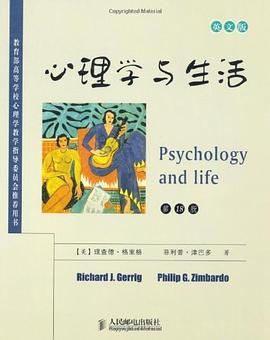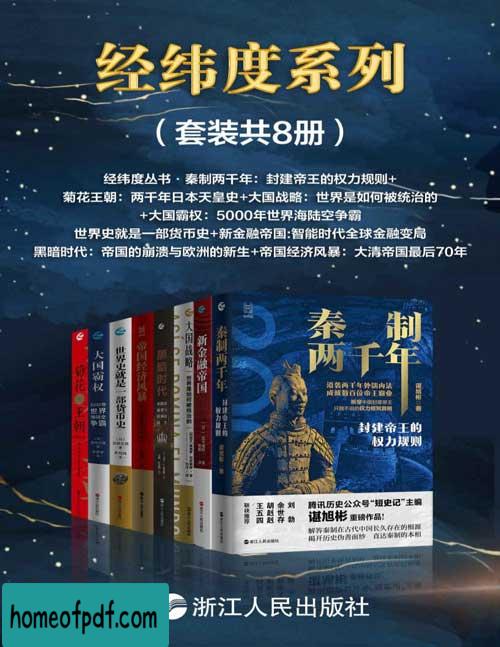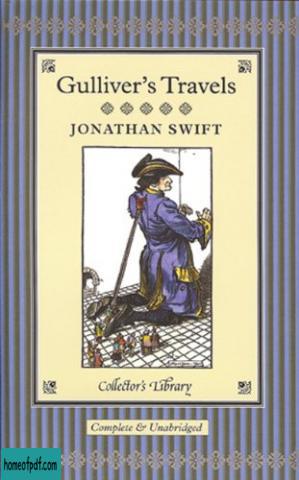Gullivers Travels (Collectors Library) 电子书下载
Its actual title is "Travels Into Several Remote Nations Of The World" as if by Lemuel Gulliver, but most people know it as "Gulliver`s Travels" and the actual author is Jonathan Swift. The book works on numerous levels, it could be viewed as an adventure story for children, an early example of fantasy/science fiction, a general satire of humanity, or a more specific satire of events, society, and politics in which Swift lived. The latter was undoubtedly the way it was taken when first publish ed in 1726 and amended in 1735, but that is the most difficult way for the reader to view the book today. The Penguin Classics edition of "Gulliver`s Travels" is of great assistance in helping the reader appreciate that aspect of the book, with a fine introduction by Robert Demaria, Jr., and detailed notes throughout the text to help explain many of the references.
Part I, "A Voyage to Lilliput" is the best known part of the book. This section has often been used in isolation of the other three parts of the book. This is the story where Gulliver is shipwrecked and washed up on a distant shore, only to find himself a captive of the Lilliputians, who are 1/12th the size of Gulliver. Swift is very detailed in discussing the minutia of Gulliver`s experience, from how much he has to eat, to how he relieves himself. Swift satirizes the court of King George I, and of course travel books where the authors stretch the truth. Gulliver starts as a captive, becomes a loyal subject, but then is forced by his own morals to refuse the requests of the King of Lilliput which allows his enemies to work against him. As a result, Gulliver is forced to flee and as fortune would have it he makes it back to home.
In Part II, "A Voyage to Brobdingnag", Gulliver once again goes to sea, and is this time abandoned when he goes to look for fresh water. This time Gulliver finds himself in a somewhat reversed position, still captive, but this time by people who are 12 times his height. The notoriety of Gulliver`s existence results in his again being a favorite of the court. Gulliver tries to impress the King with stories of Europe, but his stories of the use of guns and cannons has the opposite affect. This time Gulliver is rescued by luck when a giant bird drops him in the sea where he is found and returned again to England.
Part III, "A Voyage to Laputa, Balnibarbi, Luggnagg, Glubbdubdrib, and Japan again has Gulliver at sea, and his fortunes are worse yet, as his ship is taken by Pirates and he is marooned on an island. Here he is rescued by a flying island (Laputa) which is a kingdom where math and the arts are of paramount importance but they have no interest at all in Gulliver`s information regarding other lands. Gulliver then travels to Balnurabi where he visits their Academy which is a satire of the Royal Society at the time. Gulliver decides to go to Japan to make his way on a Dutch ship back to England, but since he has time he first goes to Glubbdubdrib. Here he discusses history with the ghosts, and learns of the immortal Struldbruggs who spend most of their existence old and infirmed. Gulliver then makes his way back to Balnurabi and on to Japan, where he manages to avoid a ceremony where he would have to trample on the crucifix before returning to England. This is the last of the sections which Swift wrote, and is the most unusual.
Part IV, "A Voyage to the Country of the Houyhnhnms" starts with Gulliver breaking his promise to remain at home and returning to the Sea. Once again misfortune sets in and his crew mutinies and eventually leaves him on an unknown shore. Here Gulliver meets the dominant species, the Houyhnhns who are like horses. The humans of this land are called Yahoos, and their behavior and actions convince Gulliver that the Houyhnhms are preferable to his own species. In the end Gulliver much prefers life among the Houyhnhms to that among humans (Yahoos), even those in England. The Houyhnhms decide that Gulliver is a danger to their society, and so they exile him. Gulliver is rescued, no thanks to his own efforts, and finds himself once again among humans. Despite being treated wonderfully by the Portuguese captain, Gulliver cannot stand being among humans, and even when he makes it back to his home in England, he prefers to spend his time in the stables with the horses. This section contains my favorite part of the book, where Gulliver tries to defend European "Civilization" to the Houyhnhms by discussing European wars.
If one is looking to read "Gulliver`s Travels" as a Children`s book, then there are better editions than this one to choose. If you are looking to read the complete book as an adventure story or a general satire, then there are several editions which contain the complete novel, though this one will work for that as well. If you are looking to read it to understand the more specific and detailed satire that it offers, then the Penguin Classics publication is a very good choice of editions. In addition to the introduction and the notes mentioned before, there are also some textual notes discussing the differences in the 1726 and 1735 editions. For the most part, this book sticks with the 1726 edition, but there are several places where Robert Demaria, Jr. opts to use the 1735 text. This is also discussed in the notes and in "A Note on the Text" which precedes the novel.
尊敬的读者:
欢迎您访问我们的网站。本站的初衷是为大家提供一个共享学习资料、交换知识的平台。每位用户都可以将文件上传至网盘并分享。
然而,随着用户上传的资料增多,我们发现部分不宜或版权问题的书籍被分享到了本站。
为此,我们已经关闭了分享入口,并进行了多次书籍审查,但仍有部分内容未能彻底审查到位。
在此,我们恳请广大读者与我们共同监督,如发现任何不宜内容,请 点击此处 进行举报,我们会第一时间处理并下架相关内容。
希望我们能共建一个文明社区!感谢您的理解与支持!
猜你喜欢
- 《张文宏说传染》张文宏文字版 电子书下载
- 《别急着吃药:90%的病不吃药也能好》卢晟晔文字版 电子书下载
- 《特朗普商业智慧丛书(三册)特朗普的成功之道》巅峰之路像赢家一样思考 [美] 唐纳德·J·特朗普 电子书下载
- 《图解成本核算》陈玉洁 电子书下载
- 《投资第一课:大师没教你的投资技巧》那一水的鱼珍藏版 电子书下载
- 《创业在路上》罗永浩文字版 电子书下载
- JavaScript on Things - Lyza Danger Gardner 电子书下载
- 《算法的力量:人类如何共同生存?》杰米・萨斯坎德文字版 电子书下载
- 《请停止无效社交》李小墨升级版 电子书下载
- 《图解佛经故事:南北大藏经》收藏版 电子书下载
- 《电影冷知识:当我们谈电影时,我们在谈什么》许立衡修订版 电子书下载
- 《如何不切实际地解决实际问题 : how to》兰道尔·门罗 电子书下载





![《Python编程》 [美] 埃里克·马瑟斯 文字版 电子书下载 《Python编程》 [美] 埃里克·马瑟斯 文字版 电子书下载](https://images-2.articlebest.top//a9e025815563b4b9bca6991c0d9459d7.jpg)






